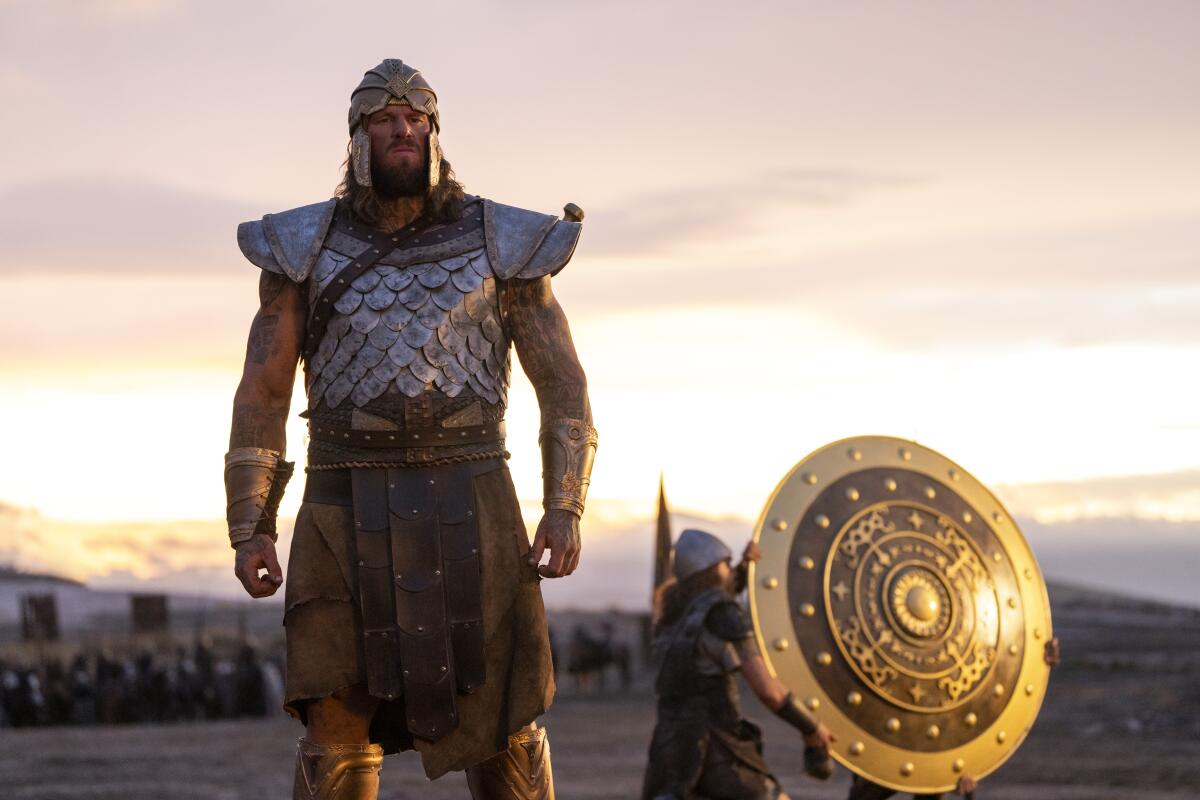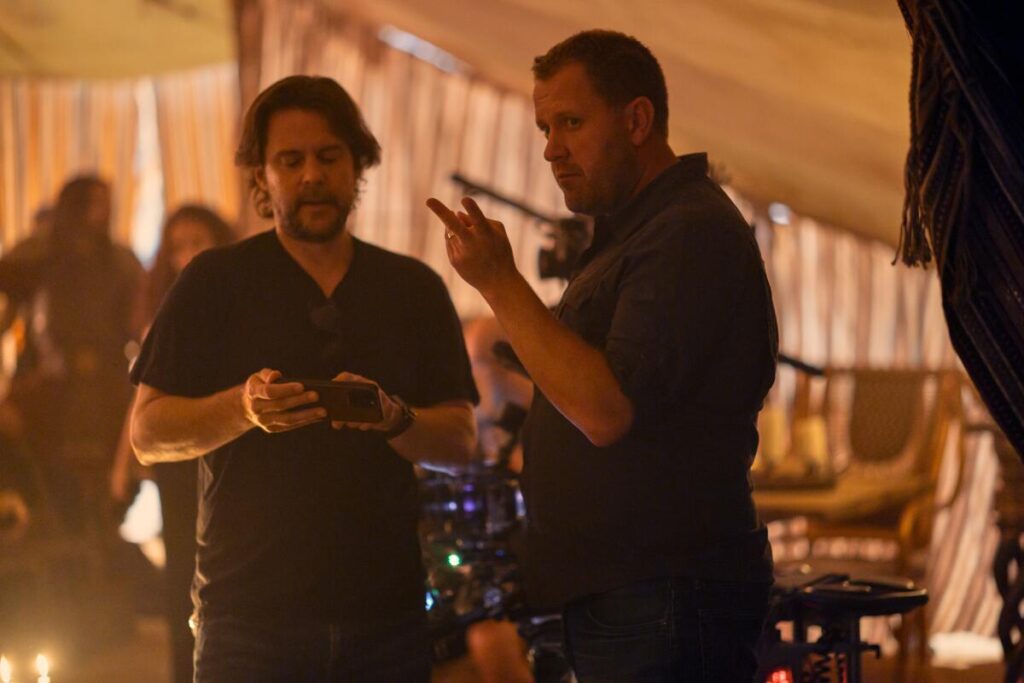Psalm writer. Sheep herder. Harp player. These aren’t the typical qualities found in a hero, let alone one to build an ambitious new television series around. But when that hero is a young man named David (played by Michael Iskander), who would live a life with defining moments like defeating a giant named Goliath (Martyn Ford) and becoming the king of Israel, “House of David” coming to life is something of a no-brainer.
What wasn’t as much of a given was that this inspirational story predominantly from the Bible would wind up finding a home at Amazon’s Prime Video. “We were thinking about doing it independently at the time,” admits executive producer Jon Erwin (“Jesus Revolution”), who said meeting with the streaming giant changed everything. “It was a huge surprise and a miracle that Amazon would really see our audience with this kind of legitimacy and give us these kinds of resources and yet allow us to be in control of the material.”
Like another successful scripted drama, “The Chosen,” which follows Jesus Christ (Jonathan Roumie), its creator recently announced that the upcoming fifth season would premiere exclusively on Prime Video in June (after a theatrical run in March), the audience watching isn’t necessarily hunting for faith-based programming, just good television, which lines up with the original “House of David” vision.
“We weren’t looking to make a religious show,” says executive producer Jon Gunn. “We’re looking to make a compelling show that we would want to watch and so, if it works, it’s not at all about religion. It’s about these humans in this moment living this story.”
The story told in “House of David’s” eight-episode first season begins on the outskirts of Bethlehem in 1000 B.C. with David growing from a harp-playing, psalm-singing teenage boy watching over the king’s sheep to the courageous young man unexpectedly anointed as the future king who also uses a single rock to bring down a giant. Besides David’s journey to power, the series also delves into the opposing House of Saul and House of Samuel. “This is a war of houses,” teases Erwin.
Executive producers Jon Gunn and Jon Erwin on the set of “House of David.”
(Nikos Nikolopoulos / Prime)
The show’s stories “come primarily from three chapters of the Bible in the book of first Samuel,” says Erwin, adding the Psalms of David (more than 70 are credited to him), were paramount in revealing a complex person with relatable humanity. “There are only a few psalms where he’s like, ‘Thank God, my life is good.’ Most of them are like, ‘I’m depressed. I’ve failed myself and my family.’ It really is the spectrum of human emotions in this incredibly honest, authentic way.”
However, to be able to tell these great stories, the right actor who could play the future king needed to be found and he would need to fulfill everything on an extensive checklist. “We were determined to find a David who was a teenager, not yet a man, somebody who had the potential to become a leader and a warrior but had the spirit of a kid who was frustrated with his father being stuck at home and wanting to live a life,” Gunn says.
That actor should also be of Middle Eastern descent and have the depth to seamlessly convey a person wrestling with both external and internal conflict. And he needed to be able to sing. “This was months and months of failing and not finding our person to the extent that you start to wonder, can we even make ‘House of David?’” Gunn says.
But the arrival of a self-tape audition from Egypt-born Iskander, who had zero television experience and one Broadway show (“Kimberly Akimbo”) to his credit, saved the day. Iskander says he knew the story of David well from Sunday school, but it was while watching “The Chosen” that he spoke aloud a destiny to manifest. “I was like, ‘I’d love to be on something like that one day.’ I told my family, and they’re like, ‘Who would you even play?’ I said, ‘maybe King David.’ Fast-forward three years later and I got an email that said, ‘audition for the character David.’”
Initially told he didn’t book the role, he put the idea of playing David behind him for a few weeks until another request for him to audition arrived again. “Immediately I call my mom and she says, ‘You better start praying and fasting right now, buddy,’” Iskander says. He listened to his mother, praying and fasting while also working with a coach to submit the best audition possible, which made it to Gunn and Erwin.
“Everything stopped,” Gunn recalls. “I watched probably 10 seconds and I lit up and then said, ‘but wait a minute, can he sing?’”
The answer was yes (Iskander had also submitted a rendition of Billy Joel’s song “Vienna”) and the actor was quickly set to meet with Erwin in New York City. “If this is a really good meeting, it will probably last about an hour. If it’s just OK, maybe like 20 or 30 minutes,” the actor recalls. The meeting went on for three hours with Erwin telling Iskander in the end, “‘I believe that you are built for this part. I believe there’s a destiny to this.’”
Another factor that worked in the actor’s favor was his athleticism. “Not only did he look and feel right and have the spirit and the voice, but he had exactly the physical training to do the authentic sling in the way we wanted,” Gunn says. To prep for filming, Iskander worked with an ancient weaponry expert but, he explains, “in high school I did shot put and discus and it was the same exact thing. It took me three days and I was pretty solid with the sling as well as with combos.”

Goliath (Martyn Ford) in “House of David.”
(Jonathan Prime / Prime)
Athletic prowess would come in handy for Iskander while shooting the iconic David and Goliath battle, which is teased in the premiere episode and then comes later in the season, but he also leaned into a less obvious emotional component in David’s heart. “I thought of the level of courage it takes to face a giant as a shepherd but also the amount of love that it takes,” Iskander says. “He was able to face the giant not because he hated him, but because David loved the people behind him and loved his God more than this giant. That’s one of the things that surprised me is his amount of love and the amount of weight that he was carrying.”
That battle needed to be believable, but, by choice, it would be done without extensive special effects. Instead, Erwin and Gunn cited films like the original “Gladiator” and “Braveheart,” which didn’t rely on technology for their larger-than-life stories.
“It really is kind of a love letter to an older way of making things that was much more grounded in reality and practical effects and forced perspective,” Erwin says. Adds Gunn, “we have built small cameras, small-form factors that allow us to go into the land here in Greece so our approach, it doesn’t feel like we’re a massive production to us.”
Filming predominantly south of Athens in Greece helped maintain a natural grandness for the project. “I wanted to film at a place where the locations were as big as the emotions,” Erwin says. “We wanted to inconvenience ourselves to go to some of these extraordinary places on Earth where the epic-ness of the landscape itself was doing the work.”
Adds Gunn, “the locations that we’re putting on film include these mountains that have structures built on them that are thousands of years old.”
Although David’s name looms large in the show’s title, Goliath is revealed to be more than merely his size. “He’s got a family, he’s got a mother (Orpah, played by Sian Webber) and there’s some history that we learn about the legends of the Nephilim,” says Gunn about humanizing the character. “When that confrontation comes, you’re invested and understand what emotionally is driving both David on one side and Goliath the other.”
And although there’s a largeness to “House of David,” its biggest strength is peeling away the stuff of legends. “Then it all becomes stories of relationships and families and parent-child struggles,” Gunn says. “This is just an epic backdrop for a very human story.”
Content shared from www.latimes.com.

